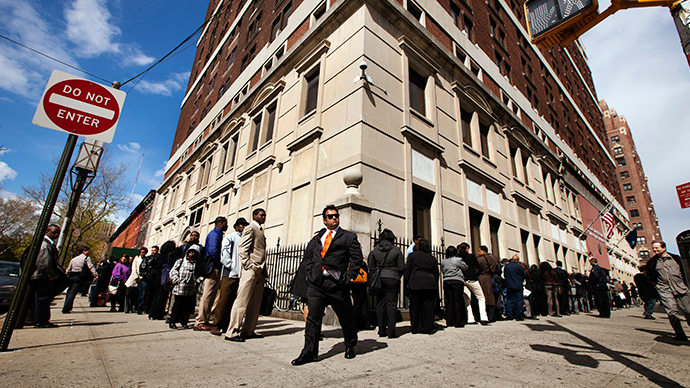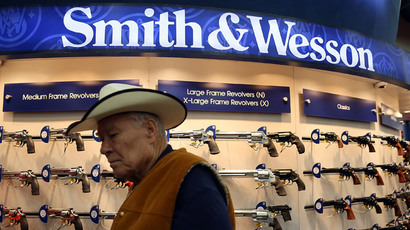Down & out: US unemployed without extended benefits nearing 2mn

Two full months have passed since almost 1.3 million long-term unemployed Americans lost their extended government benefits, a number that has since jumped by 576,000.
Of the 4 million US citizens who have been searching for work for
more than 26 weeks, more than half are no longer receiving
extended unemployment coverage. Meanwhile, millions of other
Americans who dropped out of the workforce since the start of the
Great Recession in 2008 are no longer even counted in the data.
The number of unemployed Americans is said to be 10.2 million,
according to the Bureau of Labor Statistics. Of this total, more
than 3.6 million are listed as long-term, with another 2.6
million who receive no benefits but are searching for work. Of
those who are employed, 7.3 million are working at part-time
jobs, unable to nail down full-time employment.
The January unemployment report from the Bureau of Labor
Statistics showed just 113,000 new non-farm jobs were created,
not close to the estimated 499,000 individuals who entered the
workforce. With January’s unemployment rate at 6.6 percent, it
was the second disappointing employment report in a row.
The Federal Reserve Open Markets Committee last week expressed
concern over the dismal outlook, yet maintained it would hold to
hold steady to stringent monetary policy.
"The maximum level of employment is largely determined by
non-monetary factors that affect the structure and dynamics of
the labor market," the minutes from the January 28 meeting
read. "These factors may change over time and may not be
directly measurable. Consequently, it would not be appropriate to
specify a fixed goal for employment; rather, the committee's
policy decisions must be informed by assessments of the maximum
level of employment, recognizing that such assessments are
necessarily uncertain and subject to revision."
The jobs data indicated first-time unemployment filings are
coming in at 336,000 a week, which, although considered high, is
down 3,000 from the previous week and almost on par with the
four-week average.

The lackluster employment picture puts pressure on the Obama
administration for not doing enough to stimulate job growth, as
well as on the Republicans who voted against prolonging
much-needed unemployment benefits.
Democrats on the House Ways and Means Committee issued a report
suggesting the termination of benefits cost the US economy $3
billion in January and February.
"The loss of long-term unemployment benefits is weighing down
our economy at a critical point in the economic recovery,
threatening to inflict long-term damage," said Sander Levin,
D-Mich., the leading Democrat on the House Ways and Means
Committee.
"Long-term unemployment remains an enormous challenge for
millions of Americans and our overall economy, which is exactly
why Republicans should join with Democrats to renew this
important program."
Michael Strain of the American Enterprise Institute urged
Congress to push through the extended benefits.
“A falling unemployment rate is good if the unemployed are
transitioning into employment,” Strain told PBS last month.
A falling unemployment rate is not good if the unemployed are
losing hope and giving up their job search entirely.
“Getting more people — especially the long-term unemployed —
into jobs should be the major focus of federal economic policy in
2014.”
Meanwhile, a Gallup poll conducted at the beginning of February
reported 25 percent of Americans believe unemployment is the
country’s leading issue, with the economy a close second at 20
percent.
The poll of 1,023 adults has an error rate of 4 percentage
points.
US legislators will attempt to resolve the issue Wednesday after
a weeklong recess.














